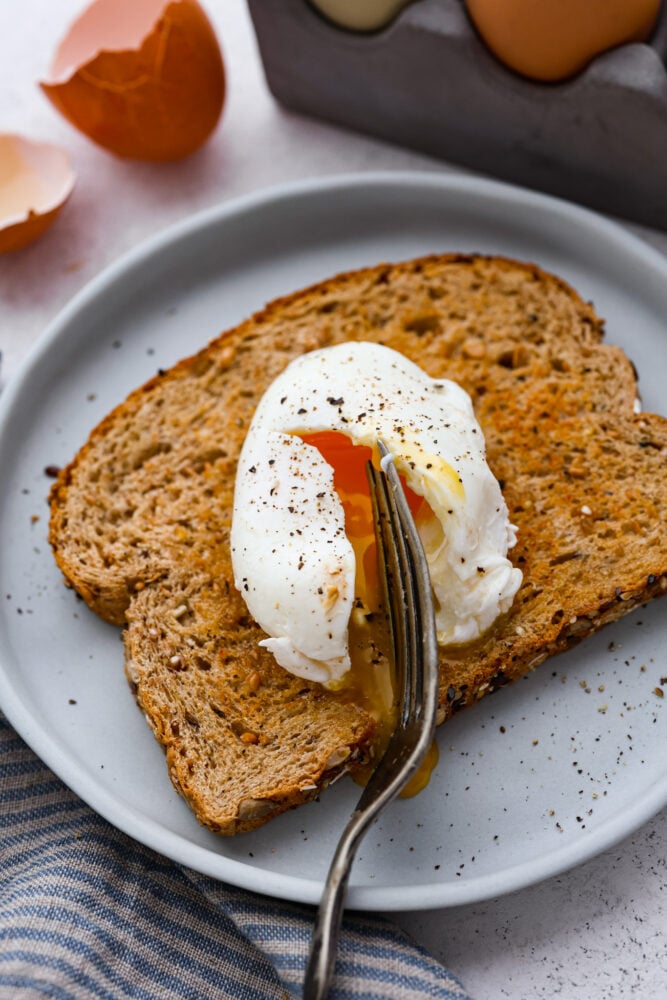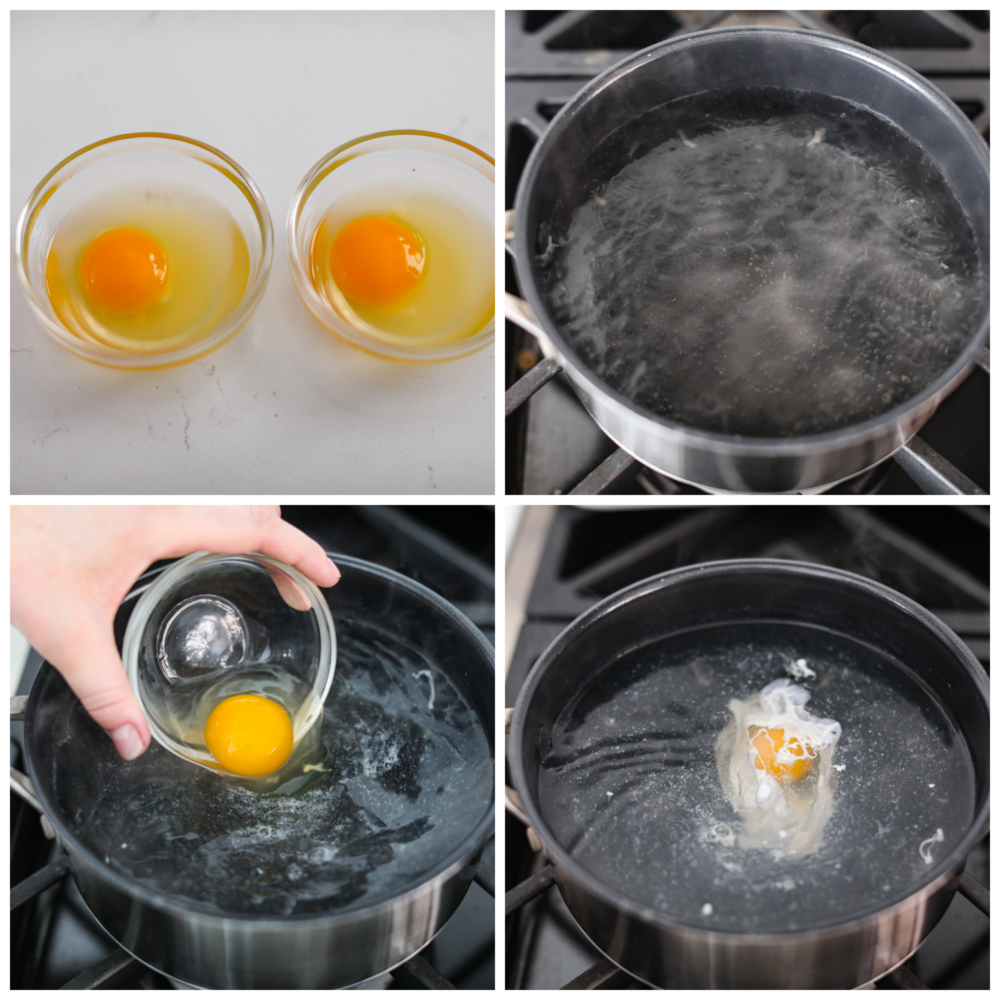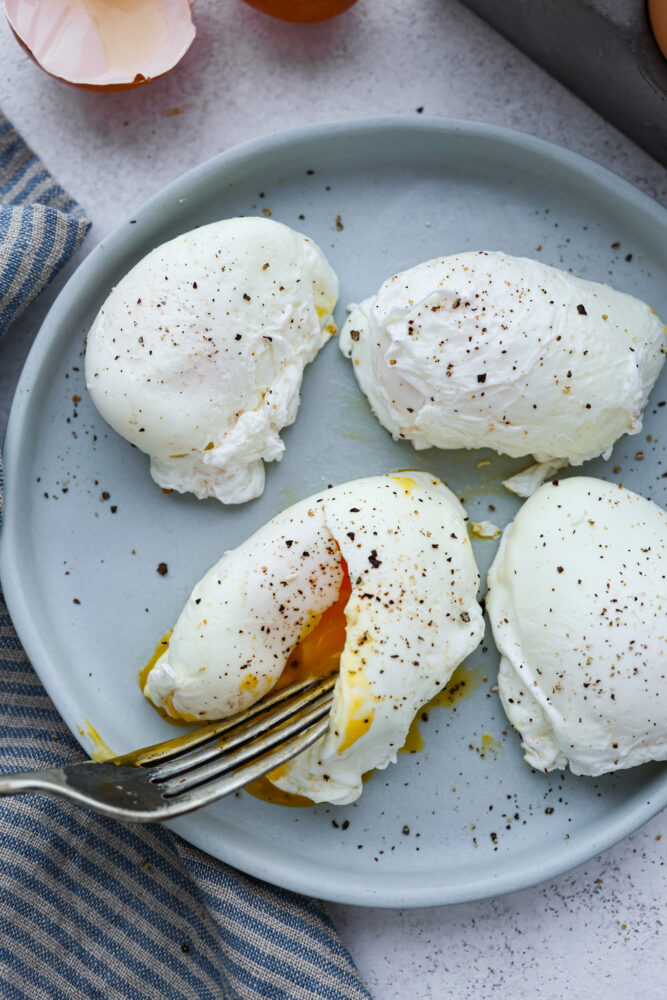How to Poach an Egg
This website may contain affiliate links and advertising so that we can provide recipes to you. Read my privacy policy.
Soft egg whites and warm runny yolks are reason enough for every home chef to know how to poach an egg! It’s not as hard as it sounds, and these eggs are so next level you won’t believe what you’ve been missing out on all these years!
I crave eggs for breakfast almost every morning! They are an awesome way to start your day and I’ve always been a fan of savory breakfasts. I like that they are full of vitamins and nutrients that keep me full and alert until lunch. If you love eggs for breakfast too, you’ve got to try these Egg Muffins, these Baked Scrambled Eggs, and this Overnight Eggs Benedict Casserole.

How to Make Poached Eggs
I think everyone should be able to make poached eggs at home! It’s easier than it looks and they are the best-tasting eggs you will ever have. Maybe you are thinking to yourself, “How does this extra work make it taste better?” Well, the simple answer is because you cook it underwater, the egg white stays pillowy soft and the yolk is runny and flavorful. There are no crispy bits, air holes, and white film messing with your perfect egg experience!
So now that I’ve convinced you that poached eggs are the coolest things since sliced bread, let’s talk about how to eat them! Of course you can eat them Egg’s Benedict style, that is definitely the classic way you will see them served. They are also incredible on a smash burger believe it or not! I enjoy them on my English muffin breakfast sandwich, and even on a slice of heavily buttered toast. You can think of it like a sunny side up egg, if you like egg yolk running over your hash browns then you’ll love these poached eggs that way too!
Ingredients
Just two simple ingredients to make poached eggs! Of course you will also need water to poached the eggs in. Other than that, this recipe is really straightforward. You can of course add more ingredients after you poach your egg. I love adding salt and pepper, and hot sauce of course! You can find more information below in the recipe card.
- Large Eggs: You can make as many poached eggs as you like with this method. I always use large grade A eggs in my kitchen.
- White Vinegar: This will help the egg stay together in the water and helps to firm the yolk in the perfect way.

Poached Egg Recipe
I promise that poached eggs are so much easier to make than you think! It is all about the temperature of the water, how long you cook them, and one special ingredient- vinegar! You will want your hot water to simmer, reducing it from boiling to a light little bubble. Your cook time should be about 4-5 minutes. Make sure that you cook eggs in simmering water, otherwise, you risk boiling the egg or it not being hot enough to properly cook it. These eggs are so perfect for breakfast or brunch on special occasions, you are going to love knowing how to make them!
- Heat Water: Bring a large pot of water to a boil, over high heat on the stove. Once it comes to a boil, reduce the heat to medium and keep it on a light bubbling boil.
- Prepare Eggs: Crack one egg into a small bowl. Add the vinegar into your water and stir it in a circle to create a swirling vortex.
- Cook Egg: Gently but quickly pour the egg out of the bowl and into the center of the vortex. Cook the egg for 4-5 minutes.
- Lay On Paper Towel: Remove the egg with a slotted spoon and place it on a paper towel lined plate to absorb any excess liquid.
- Repeat: Repeat with your remaining eggs.
- Enjoy: Serve fresh or keep them refrigerated for up to 3 days in an airtight container.
Tips for Making Poached Eggs
I’m about to remove all the mystery of cooking poached eggs! There are definitely a few different methods to poaching eggs, but I think that this recipe is the easiest. Here are a few tips to answer any questions you might still have.
- Temperature of the Water: Your water temperature should be right around 180 degrees Fahrenheit. If it’s much cooler or hotter than that, it most likely won’t turn out very well. At exactly 180 degrees, your water will not be simmering, which will mean less movement of the egg and a better chance of the whole egg turning out. As you can tell, in this recipe I mention the water is simmering and I don’t temp the water. You can get away with the water hotter than 180, but it needs to stay below 212.
- Straining Your Eggs: You can either use a slotted spoon or a fine mesh strainer to remove the egg from the poaching water. This will help to remove any of the wispy egg whites.
- Using Fresh Eggs: You want to avoid using old eggs because their whites can become looser and lose their shape more quickly. Fresh egg whites seem to stay firmer and just turn out better overall in my experience.

Storing Leftovers
Poached eggs are a really fun treat that can look so fancy! They also taste incredible. Here is how to store your leftovers.
- In the Refrigerator: You can store your leftovers in an airtight container in the refrigerator for up to 3 days. Reheat slowly in the microwave or oven to not cook the yolk.
-
Bring a large pot of water to a boil, over high heat on the stove. Once it comes to a boil, reduce the heat to medium and keep it on a light bubbling boil.
-
Crack one egg into a small bowl. Add the vinegar into your water and stir it in a circle to create a swirling vortex.
-
Gently but quickly pour the egg out of the bowl and into the center of the vortex. Cook the egg for 4-5 minutes.
-
Remove the egg with a slotted spoon and place it on a paper towel lined plate to absorb any excess liquid.
-
Repeat with your remaining eggs.
-
Serve fresh or keep them refrigerated for up to 3 days in an airtight container.
Serves: 4
Calories64kcal (3%)Carbohydrates0.3gProtein6g (12%)Fat4g (6%)Saturated Fat1g (5%)Polyunsaturated Fat1gMonounsaturated Fat2gTrans Fat0.02gCholesterol164mg (55%)Sodium63mg (3%)Potassium61mg (2%)Sugar0.2gVitamin A238IU (5%)Calcium25mg (3%)Iron1mg (6%)
All nutritional information is based on third party calculations and is only an estimate. Each recipe and nutritional value will vary depending on the brands you use, measuring methods and portion sizes per household.
